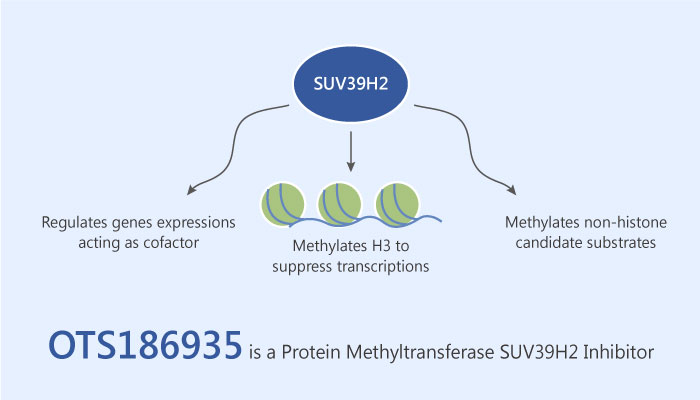SUV39H2 (Suppressor of variegation 3-9 homolog 2), also known as KMT1B, is a member of the SUV39 subfamily of lysine methyltransferases (KMTs). SUV39H2 results in heterochromatin formation and transcriptional repression. In addition, it is report that SUV39H2 methylate histone H2AX at lysine 134 and enhance the formation of phosphorylated H2AX (γ-H2AX), which causes chemoresistance of cancer cells. Furthermore, accumulating evidence indicates that SUV39H2 acts as an oncogene and contributes to the initiation and progression of cancers. Thus, SUV39H2 plays a critical role in human tumorigenesis. Moreover, due to its selective expression in cancer cells, SUV39H2 is an attractive molecular target for anti-cancer therapeutics. On the other hand, owing to the intricate relationship between SUV39H2 and γ-H2AX formation, SUV39H2 inhibition may be a promising potential drug target in various types of human cancer.
In this study, OTS186935, as a SUV39H2 methyltransferase inhibitor with an IC50 of 6.49 nM, has anti-cancer activity.

First, OTS186935 inhibits A549 cell growth inhibitory effect with IC50 of 0.67 μM. In addition, Xenograft mouse models of MDA-MB-231 triple negative breast cancer (TNBC) cells and A549 cells show high expression levels of SUV39H2, and OTS186935 has a significant growth suppressive effect in them. Moreover, OTS186935 results in a tumor growth inhibition (TGI) of 42.6% and 60.8% in the breast cancer and lung cancer mouse models, respectively. Meanwhile, OTS186935 displays a potent anti-tumor effect associated with reduction of H3K9me3 levels, and was well tolerated during the treatment.
In summary, OTS186935 is a potent SUV39H2 inhibitor with anti-tumor activity. It may provide a novel therapeutic approach for treatment of various types of human cancer.